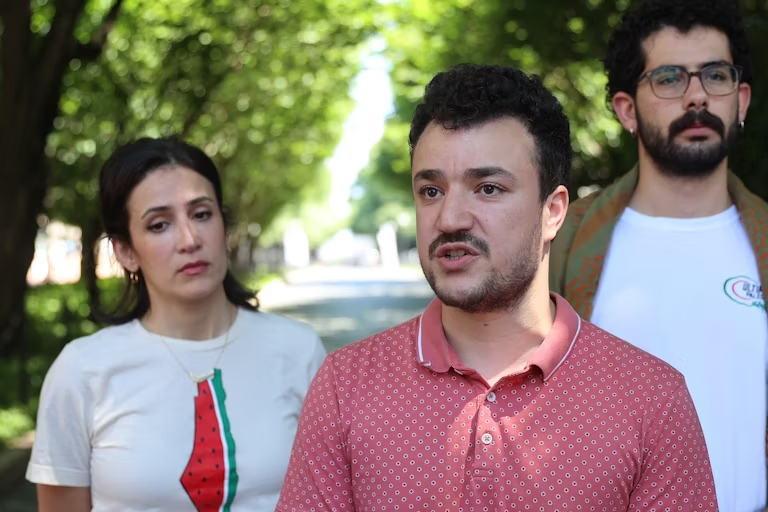US Court Blocks Deportation

Activist Mahmoud Khalil's arrest spurs nationwide protests
In a striking decision, a federal judge has temporarily halted the Trump administration's attempt to deport Palestinian activist Mahmoud Khalil. Khalil, a permanent U.S. resident and a Columbia University graduate, was apprehended by immigration officials over the weekend, igniting a wave of protests and drawing national attention.
Khalil emerged as a prominent figure during last year's Gaza war protests at Columbia University's Ivy League campus in New York City. His arrest comes as part of President Donald Trump's intensified efforts to curb pro-Palestinian activism on college campuses, a move he declared as "the first arrest of many to come."
On Monday, a throng of protesters gathered in Lower Manhattan's Foley Square, brandishing Palestinian flags and demanding Khalil's release. The demonstration, which later moved towards city hall, saw at least one additional person detained amidst growing tensions.
Columbia University Professor Michael Thaddeus voiced the community's concerns, stating, "We're facing a horrifying reality that our own student, a member of the Columbia community, has become a political prisoner here in the United States."
Set to appear in court on Wednesday, Khalil faces accusations from the Department of Homeland Security (DHS) of "leading activities aligned to Hamas," although specific details remain undisclosed. His lawyer, Amy Greer, denounced the detention as "terrible and inexcusable," describing it as a stark example of the U.S. government's suppression of political expression and student activism.
Born as a Palestinian refugee in Syria, Khalil has yet to be charged with any crime. Immigration and Customs Enforcement (ICE) agents revoked his student visa and green card upon his arrest at his university-owned apartment in Manhattan. He was initially held at a New Jersey facility before being transferred to a detention center in Jena, Louisiana.
Adding to the personal turmoil, Khalil's attorney revealed that ICE agents threatened to detain his wife, an American citizen who is eight months pregnant. She was misled about his whereabouts when she attempted to visit him in New Jersey.
Columbia University clarified that law enforcement can operate on campus with a warrant, but denied any invitation extended to ICE agents by university leadership. The Trump administration, meanwhile, has underscored its stance against student activists perceived as "terrorist sympathisers," with Khalil being the first publicly known detainee under this policy.
Secretary of State Marco Rubio reiterated this position on social media, affirming the revocation of visas and green cards for Hamas supporters in the U.S. Furthermore, the administration recently withdrew $400 million in federal grants from Columbia, citing alleged failures to combat antisemitism on its campus.
Last year's protests at Columbia were a flashpoint in the national debate over the Gaza conflict and U.S. support for Israel. Khalil played a central role, leading negotiations for the Columbia University Apartheid Divest movement, which saw the establishment of a large protest encampment on university grounds.
New York Civil Liberties Union President Donna Lieberman criticized Khalil's attempted deportation as "targeted retaliation and an extreme attack on the First Amendment," while New York Attorney General Letitia James expressed her deep concern and pledged to closely monitor the proceedings.
The protests have sparked controversy within Columbia, where some Jewish students expressed concern that the rhetoric occasionally veered into antisemitism. Despite these tensions, many Jewish students also participated in the pro-Palestinian demonstrations.
Carly, a Jewish-American graduate student and friend of Khalil, defended his character, describing him as a "very, very caring soul" and lamenting the misrepresentation he faces. "It's very painful, as someone who knows him on a personal level," she shared, opting to withhold her surname for privacy reasons.
The backdrop to these events is the ongoing Israeli military campaign against Hamas, initiated after a significant cross-border attack into Israel on October 7, 2023, which resulted in substantial casualties and hostages. The conflict has claimed over 48,000 Palestinian lives in Gaza, according to the Hamas-run health ministry.
As the court proceedings unfold, Khalil's case continues to resonate as a potent symbol of the complexities and controversies surrounding free speech, activism, and immigration in the contemporary American landscape.
 Author: Azadeh Haidari-Garmash, RCIC
Author: Azadeh Haidari-Garmash, RCIC
